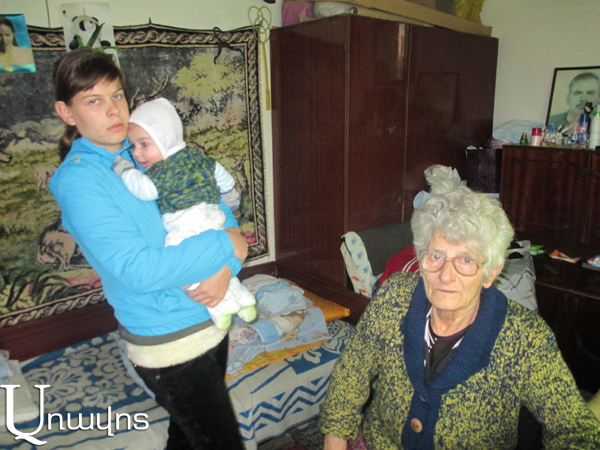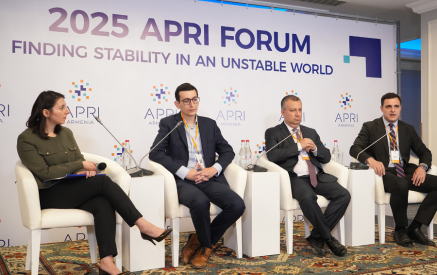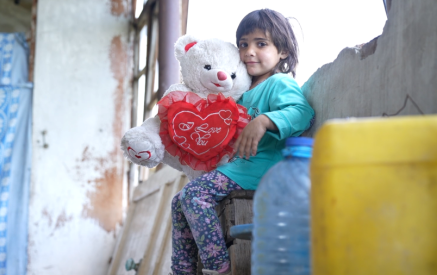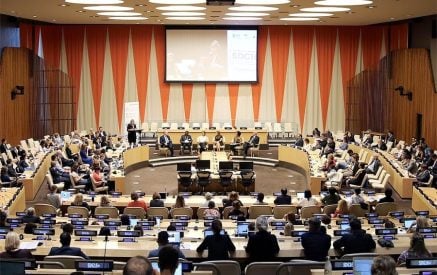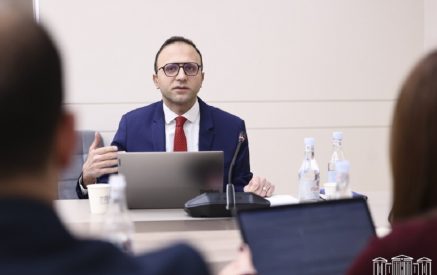11-year-old Mariamik, unlike many of her peers, does not dream of soft toys, “Barbie” doll and computer games for children. Mariamik wants warm clothes, warm winter shoes and dreams of tangerine and condensed milk. It’s not that she has never eaten tangerine, 1-2 times a year, her mother, Mrs. Ruzan, truly, in debt, but buys it. Mariamik’s family consisted of 4 members: her mother, sister, sister’s daughter (6 years old Lilit) and she, lives in a small living room, 13.7 square meters area. This family lives, better to say, goes along with 42 thousand drams, as Ruzan says, with poverty allowance and disability pension together. Once she received the money, as Mrs.
Ruzan tells in the interview with “Aravot”, buys oil, potatoes and macaroni, and repays some to the debtors, and so they are broke, and, again, she borrows new debt. She says, it’s good that there are people who can lend money. Meat, sweets, cheese and fruits are still a dream for this family. “No, what are you talking about? We eat meat once a year, on the New Year, I make dolma. As for fruits, I my,” she cannot keep talking, Mrs. Ruzan lowers her head so that I could not see her tears… after a few minutes of silence, she says, “I and my Mariamik are eating at the charitable canteen, they give 2 pieces of bread, sometimes when they give apple, we bring it home, too, divide into 4 parts and eat it.” Mrs. Ruzan does not work, she says that every minute an epileptic seizure can happen, she refrains from talking about the elder daughter, she has a disability and cannot work, she is even unable to apply to the appropriate authorities to get a category and pension. “On hearing about her disability, she becomes furious and nervous, and I stop talking.
” The woman says that she is still lucky meeting good people. There are spouses coming to their yard to sell agricultural products and lend cabbage, carrots, greens and some other products to them. “Cold days came, my children do not have winter shoes and clothes, what they had I have already mended. I do not know what to do, this minor (showing her daughter and granddaughter) are not guilty for living in poverty. Let God at least opens a door for them and come out of this poverty,” says Mrs. Ruzan. Mariamik and her niece, 6 years old Lilit, look younger compared with their age. They are thin and short. “Doctors say that they have shortage of vitamins, well, if they are unable to supplement it with the food, the doctor had prescribed pills, I bought some and they took it, but now I have no money,” tells Ruzan.
There is a sink in a very small place, barely about half a meter, on the 2nd floor of the dormitory. Next to the sink, there is a tightly installed, worn out and anti-hygiene toilet without a door. This is the WC of Mrs. Ruzanna’s family, she says that that put a basin onto it and quickly bathe the kids, of course, not every day, now, it is cold and the kids bathe more rarely not to get cold and sick. Mrs. Ruzanna said, “If I could be able to privatize this small room, it’s about 40 thousand, it is a huge amount of money for me, once the former prime minister visited us, he learned about the problems and said that they will do something, but he went away and forgot.”
Head of the Households Research Department at the National Statistical Service (NSS) Diana Martirosyan, in the conversation with “Aravot”, said that the minimum living basket and food basket was determined years ago. It is published every quarter. “The food basket per month is 46,624 AMD per person, and the food basket varies with the season, this quarter it is AMD 56,600 per capita. Extremely poor is the person whose income does not exceed 22,993 drams. This is the World Bank methodology.” In other words, Mrs. Ruzann’s each family member is extremely poor. In the conversation with us, Ruzan introduced us to her neighbors, who also can be considered extremely poor. When approaching Vardashen 6th Street, 68A building, you can immediately be attracted by the shabby look of this building. Residents say, well, all of us are vulnerable, one – more and the other – less. Although these residents barely make both ends meet, but always help one another. For example, sharing a bowl of hot soup, macaroni and bread to each other. 75 year old Rima Kesoyan’s family consists of 4 persons: her grandson, grandson’s wife, their 4-year-old Robert and she. All 4 of them are living by the grandmother’s pension and family allowance of 45 thousand drams. The daughter-in-law, prior to the birth of the child, was working at a restaurant and for better or worse they could live, Mrs. Rima’s 31-year-old grandson from time to time was going out to work, if there was a renovation work for an apartment. “My grandson is ill, he goes to work and it happens that he feels bad and comes home, his blood pressure goes high at once and he feel feeble, falls down, and for days and months he could not have a job. He also has a bit of mental problems, gets irritated for not being able to keep the family, and thus, being so much nervous he wants to kill himself. I say, let at least he receive a category of disability, they would get more money, therefore, he needs to go to the mental hospital in Avan district, but he refuses to go there saying, “Do you want me to go there, go mad and kill someone?” I am going mad, this 4 -month-old child is fed on artificial food, a can of this food costs 6 thousand drams and it is enough for 4 days only, I’m an sick disabled woman, I cannot take care of the child for my daughter-in-law to work, nor I can work. Every day, I am asking God to find a way out. We are living worse than a dog, the dog at least finds something outside to eat,” tells Mrs. Rima without stopping the tears. She says that she is hungry for days, the available 45 thousand drams that she receives daily ends on the same day. They borrow the milk mixture for her grandson Robert from the nearest pharmacy, and the dress for the little one, as this old woman said, is given by good people. Although, there is a minor in the house, this family saves on electricity consumption. Mrs. Kesoyan says that they heat the room only when bathing the child. 5- year-old Heghine and her 3-year-old brother Levon growing up in poor conditions, often half-full and deprived of food rich in vitamins. At the moment of our visit, they were asleep. Their grandmother, Mrs. Hasmik, asked not to wake them up, in a sleep they would at least deceive their stomach. The children live with their mother in grandmother’s tiny, damp and cracked walls basement room. 3-year-old Levon, as the grandmother tells, has respiratory problems, and his sister – kidney problem. “The doctors have told me not to turn on a wood-stove, because it harms Levon, how can I not turn it on, how else I can heat this basement, doctors say that he should not stay in a damp room, the children should be well fed, yes, but what can we do?” tells Mrs. Hasmik. The main income of this family is 52 thousand drams: family allowance and grandmother’s pension and the mother sometimes takes an order for preparing mourning wreath, and at least they do not consider them extremely poor, they make ends meet. Recently, sponsored by the World Bank, NSS published annual report on “Social Snapshot and Poverty in Armenia, 2013”, and the Chapter “Child’s Poverty” reads, “3.3 % of children under 18 live in extreme poverty, while 37.3 % – in poverty. 27.0 % of Armenia’s population is extremely poor, and the poor – 32.0 percent.”
According to the report, children are more exposed to both general and extreme poverty risk than the population of Armenia as a whole. 39.2 % of girls in child’s poverty line is poor, boys – 35.7% (37.3 % of all children). 3.8 % of children in urban areas live in extreme poverty, whereas 2.4 percent of children in rural areas. Child’s poverty, according to the report, has grown in 2013 as compared to 2008. Note that compared to 2012, according to the official data, the poverty rate in 2013 has dropped by 0.4%. NSS has calculated on how much money is needed to eliminate poverty. NSS specialist Diana Martirosyan says that it requires 83.9 billion drams, 2 % of GDP, while elimination of extreme poverty requires 2.7 billion drams. “The World Bank has studied these rates and has found out that the mentioned amount is doubled and even tripled when actually reaching this amount to the poor.”
Nelly BABAYAN



















































